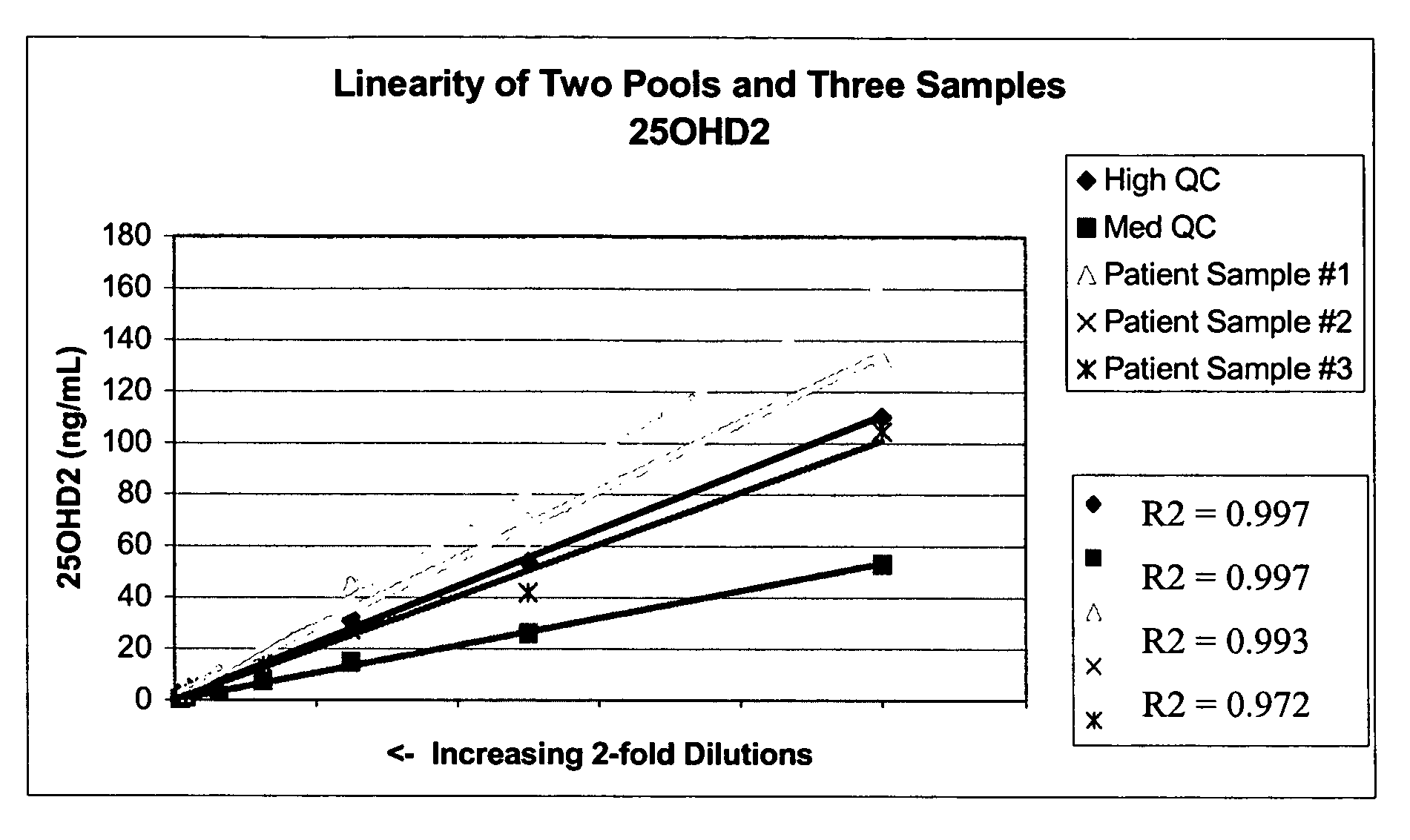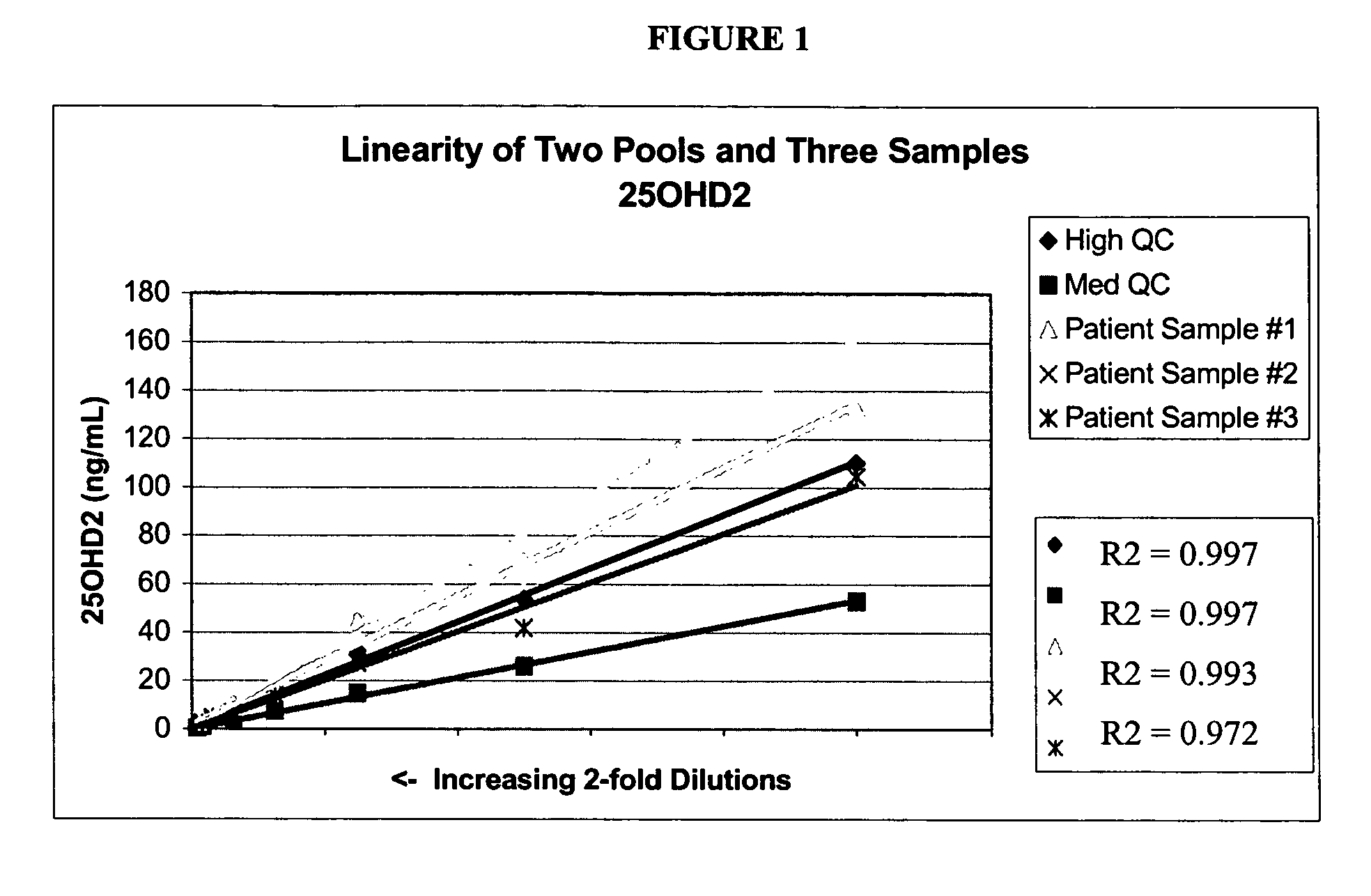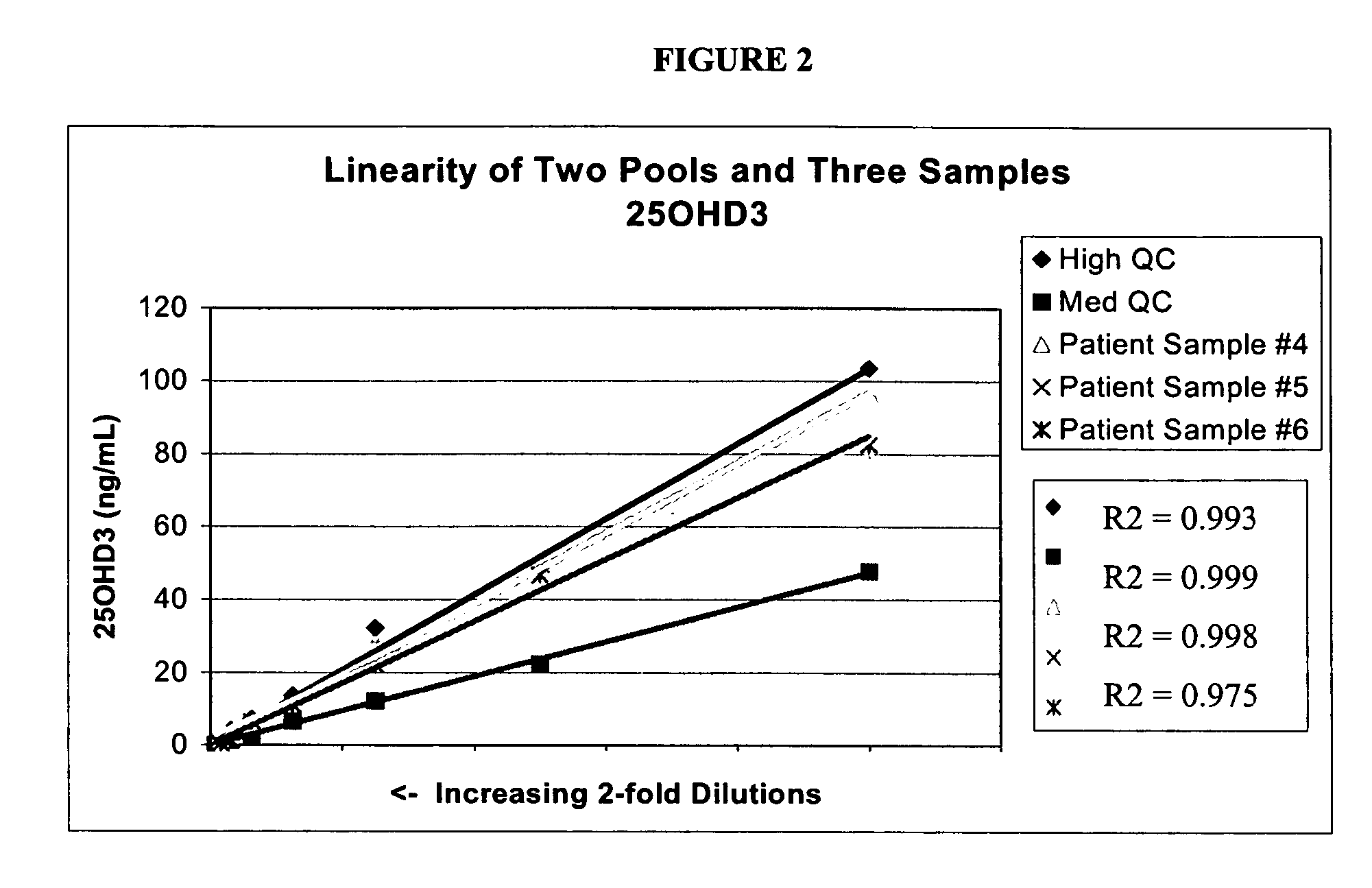Methods for detecting vitamin D metabolites by mass spectrometry
a technology of mass spectrometry and metabolites, applied in the direction of material analysis, material analysis by resonance, instruments, etc., can solve the problems of rare clinical setting measurement of vitamin d, the inactive vitamin d precursor, and less diagnostic value, and achieve high turbulence and increase the degree of separation
- Summary
- Abstract
- Description
- Claims
- Application Information
AI Technical Summary
Benefits of technology
Problems solved by technology
Method used
Image
Examples
example 1
Determination of 25-Hydroxyvitamin D3 and 25-Hydroxyvitamin D2 by LC-MS / MS
[0058]Using a Perkin-Elmer MultiProbe II (S / N 432400) robotic liquid handler, human serum samples were first extracted using a protein precipitation method by adding 42.5 μl of serum to 170 μl of methanol (1:4 ratio of serum:methanol) in a 96-well plate format. For validation-related experiments, the methanol was spiked with hexadeuterated 25OHD3 (6D-25OHD3) as an internal standard. The 96 well plates were centrifuged to remove precipitated protein, leaving the vitamin D metabolites in the supernatant. The supernatants were then transferred to an HPLC autosampler for loading to the LC-MS / MS analyzer.
[0059]LC-MS / MS was performed using a Thermo Finnigan LC-MS / MS analyzer (Thermo Finnigan Quantum TSQ (S / N: TQU00655)) with an atmospheric pressure chemical ionization (APCI) source as the detector. An autosampler was used to inject 50 μL of extracted sample supernatant onto an HPLC column. Liquid chromatography was ...
example 2
Intra-Assay and Inter-Assay Precision
[0065]Stock solutions of 25OHD2 and 25OHD3 were added to pooled serum to produce a Low Pool (20-25 ng / mL of each metabolite), a Medium Pool (45-55 ng / mL of each metabolite) and a High Pool (100-110 ng / mL). Pooled patient serum was used for the Medium and Low Pools, and stripped serum from Golden West Biologicals, Product #SP 1070, was used for the Low Pool. Twenty aliquots from each of the Low, Medium and High Pools were analyzed in a single assay using the LC-MS / MS protocols described in Example 1. The following precision values were determined:
[0066]
TABLE 2Intra-Assay Variation: 25-Hydroxyvitamin D2 (25OHD2)LowMediumHigh092804-L092804-M092804-H 126.546.4103.3 223.251.196.7 323.152.4107.8 421.650.3104.5 526.347.596.2 625.154.498.5 725.954.6100.0 821.950.1110.1 923.450.897.61023.553.2105.11122.252.9105.91224.054.694.51326.249.493.41424.159.0113.01525.852.9112.41623.959.2113.41729.552.4107.71824.250.0115.51919.853.5114.92026.360.2126.6Average (ng / ...
example 3
Analytical Sensitivity: Limit of Detection and Limit of Quantitation Studies
[0071]To determine the limit of detection of the assay, blank diluent was analyzed 17 times within a single run using the LC-MS / MS protocols described in Example 1. The mean and standard deviation were then calculated. The limit of detection was determined as 2 SD above the mean of the blank peak area ratio based on a back calculation of peak area ratio against the calibration curve. The limits of detection were as follows:[0072]25OHD2: 3.0 ng / mL[0073]25OHD3: 3.5 ng / mL
[0074]To determine the limit of quantitation, stock solutions of 25OHD2 and 25OHD3 were used to generate standard curves with the following concentrations: 0, 2, 4, 8, 16, 32, 64 and 128 ng / mL. The diluted samples of the standard curve were analyzed in quadruplicate over five assays using the LC-MS / MS assay described in Example 1. The results of the study were as follows:
[0075]
TABLE 6Limit of Quantitation Study Results: 25-Hydroxyvitamin D2 (25...
PUM
| Property | Measurement | Unit |
|---|---|---|
| mass to charge ratio | aaaaa | aaaaa |
| concentrations | aaaaa | aaaaa |
| mass to charge ratio | aaaaa | aaaaa |
Abstract
Description
Claims
Application Information
 Login to View More
Login to View More - R&D
- Intellectual Property
- Life Sciences
- Materials
- Tech Scout
- Unparalleled Data Quality
- Higher Quality Content
- 60% Fewer Hallucinations
Browse by: Latest US Patents, China's latest patents, Technical Efficacy Thesaurus, Application Domain, Technology Topic, Popular Technical Reports.
© 2025 PatSnap. All rights reserved.Legal|Privacy policy|Modern Slavery Act Transparency Statement|Sitemap|About US| Contact US: help@patsnap.com



